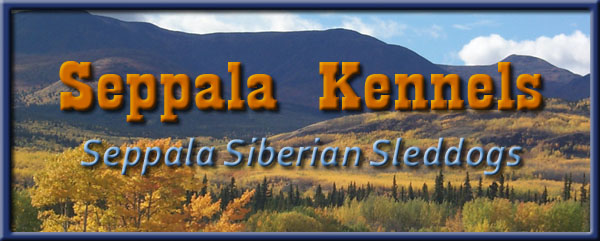Elegy for a Fifteen Year Old Sleddog(A Work in Progress)Copyright ©2014 J. Jeffrey Bragg
Note to the reader: This is an elegy in the tradition of Alfred, Lord Tennyson's "In Memoriam A.H.H.", it was written over an extended period of time and with quite broad terms of reference. I had never before attempted a poem of this scope. It is all still subject to minor ongoing editing by the author. If the language is at times clumsy and plain, that is because my overriding objective is truth, if necessary at the expense of stylistic considerations.
In the work are included several tributes to American and English poets of the past who have written elegies or whose work deals in some way with death and our reaction to it. In these I have tried as best I can to emulate but not to parody the style of the poet in question. Hence these parts of the elegy vary considerably in prosody from the rest. I have also illustrated this long poem with photographs, both for visual relief on the web page and to avail myself just a little of the web's multimedia potential.
I invite commentary and critique via e-mail from serious readers of this work. Writing it has been a learning experience and I am eager to share the perspective of the reader. I can be reached at this address: jjeffrey(at)seppalasleddogs.com .
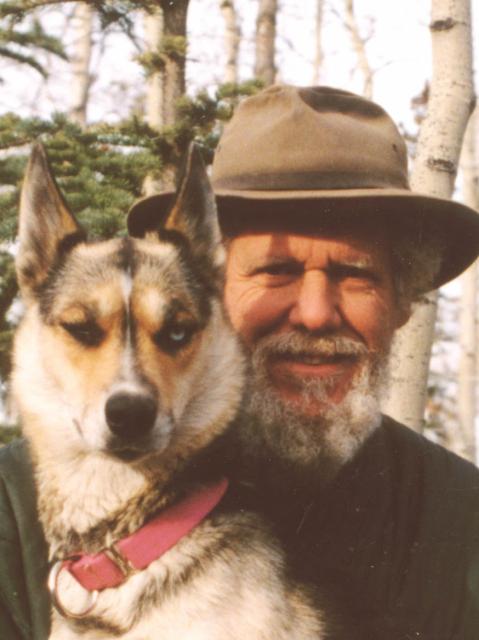
Tonya is dead.
That is the fact
From which I cannot escape.
It is Christmas night
Of the year in which she died.
It happened nearly five months ago
On the second of August
When it was still summer.
I watched her die,
Saw the light fade from her eyes
As she lay halfway out of her doghouse.
I dug her grave,
Laid her body in the damp earth,
Covered it over with turf,
Arranged stones from the pasture
In a roughly-squared oval around her resting place.
I picked wildflowers and laid them over her.
I placed a small moulded resin doghouse
Behind her grave for a spirit house.
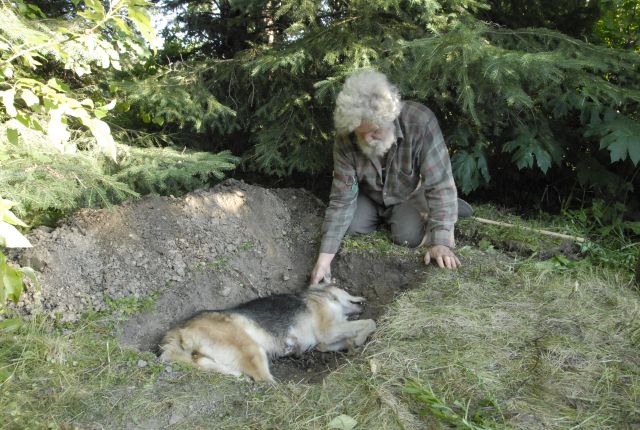
I did these things; my memory is quite clear.
I can have no doubt that my companion of fifteen years
Is gone, dead and buried —
But I cannot accept these facts.
I put aside the comfortable overcoat of religion.
I flay the carcass of poetry.
I disembowel the guts of emotion,
Carve away the muscle of rhetoric.
These bones that remain must be truth itself,
Else I am lost.
I do not want to use fancy words, meter or rhyme
To palliate, sidestep, avoid or deny this simple truth:
Tonya is dead.
Her life lasted fifteen years, nine months and one day.
Every day for the past five months
I have gone to her graveside,
Some days as often as five or six times,
Some days only once.
I have worn her purple collar around my right bicep
Continuously night and day since she died.
This is neither comfortable nor convenient
But I do not want to stop wearing it.
I talk to Tonya, sing her special little song to her.
I tell her how much I miss her.
I beg her to stay with me, not to fade away.
I ask her to haunt me.
When I go someplace in the big green Dodge four-wheel-drive pickup truck
I call aloud to Tonya,
Open the door or window,
Beg her to jump in and come with me.
I think she does.
I hope so.
I write these things down
At grave risk of bathos,
Knowing I must take that risk
To get at the truth.
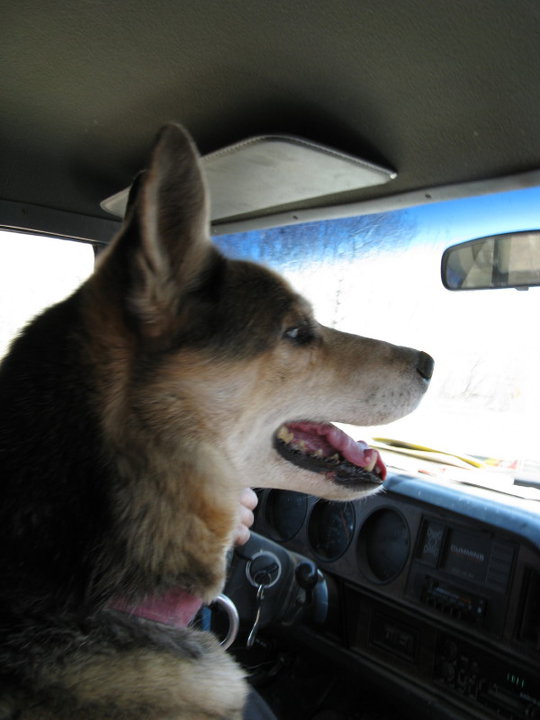
This is an elegy, a poem in memory of one departed.
(Departed is an euphemism for "dead.")
Traditionally an elegy has three parts, phases or elements:
Lamentation and sorrow at the subject's death;
Praise of the subject and of her life;
Consolation and transcendence over grief and loss.
Our era is suspicious of all three;
A postmodern elegy is a dubious undertaking.
I have nothing to hide so I say these things up front;
I'm not trying to pull a literary fast one.
Maybe I'll get a more sympathetic hearing
Because I'm starting with three strikes against me,
Or make that four, since my subject is a dog.
Now I should praise Tonya!
How to do that without bathos?
For Tonya was "only a dog."
The truth is, Tonya was never only a dog.
She was special, essential and knew it.
In her working life she was always the leader,
Above, beyond any of the other sleddogs,
Completely given to her work as a leader of teams.
Out of harness, away from a dog team
She was proud, smug, one might even say conceited.
Proud though she was, Tonya loved me — in her way.
She was as given to me as she was to her work,
But her love was proud, it never was humble nor abject.
Tonya was Queen, her love was always demanding.
The Dodge was her truck —
She only allowed me to drive it.
I was her chauffeur, one of the amenities.
She ate ice cream cones at the Dairy Queen in Whitehorse
Licking the ice cream human fashion,
Biting only when she had lapped it down to the cone.
On leash she skittered along the streets of Whitehorse —
The lounging Gwitchen on Main Street shouted to me,
"Hey Mister! That's a bush dog you got there!"
Cautious and bush, her great heart ruled her fear.
She shook like a leaf at hookup but never hung back.
She ran double lead only, needing another to race with
But she ran the legs off each of my best male leaders.
She was trained as a leader always, right from the start.
Before she was four months old
It was obvious what she would be.
As a yearling she ran with my best male leaders Lloppie and Lleo.
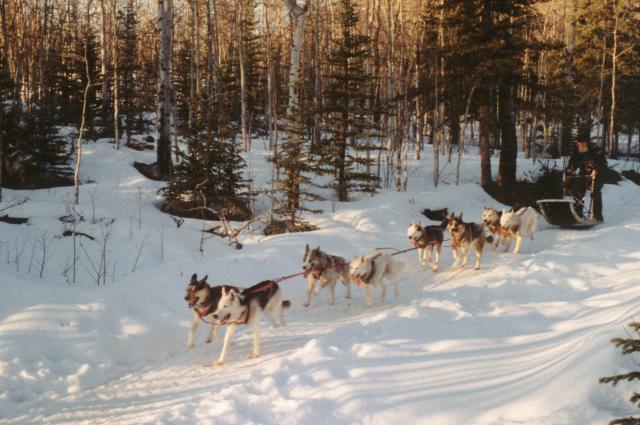
Do I have to go through all this?
I find my resistance is great.
I do not want to recapitulate,
To recount to others all that she meant to me,
To narrate the story of Tonya's exceptional life.
These memories are mine,
I selfishly wish not to share them
But a grim compulsion drives me to pencil and paper.
Milton, Shelley, Keats and Tennyson
Had meter, rhyme and poetics at their command.
They could chunter solemnly on indefinitely,
Stanza upon dignified stanza,
Arranging, deepening, chanting their grief to the world,
Relating their personal sorrows
To the condition of humankind and the eternal verities.
A postmodern poet
(If indeed that isn't just a contradiction in terms)
Is deprived of those tools,
Possesses few credible options —
Only the bare bones of language,
Just dry, stark, simple, clumsy words.
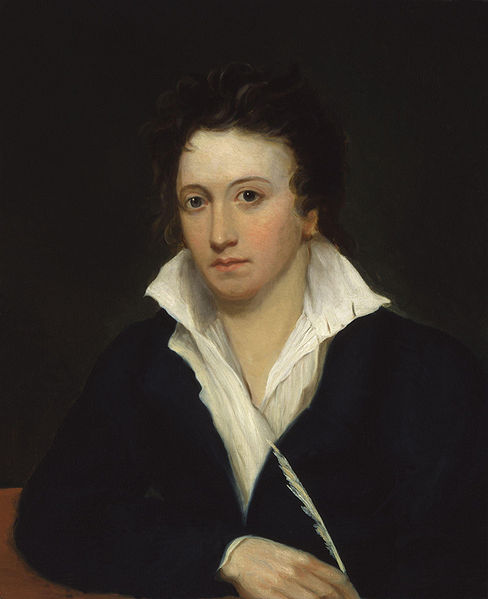
APOSTROPHE TO THE SLEDDOGS — A Nod to Shelley
Sing, dogs of draught, your howling hymn of grief!
Sing, and lament the passing of your Queen.
For sneaking Death has, like some midday thief,
Rapt Tonya from our midst and crept unseen
Away with our brightest jewel. Our sorrow keen,
Howl forth our loss, for now on Hades' shore
Forging her trail where none of us has been,
Tonya loose-leads the way to heaven's door.
Howl for the leader Queen who lopes our trails no more.
Tonya is dead.
I watched her die.
I dug her grave
And laid her body in the damp earth.
Why, then, do I go to her graveside each day,
Talk to her, sing to her,
Beg her to come in the house and sleep on my bed?
What am I doing? Do I deceive myself?
If not, then do I wilfully tell myself lies?
I feel compelled to do these things
Knowing full well how foolish and empty they seem.
A sixty-six year-old man singing to his dead dog,
Undoubtedly senile.
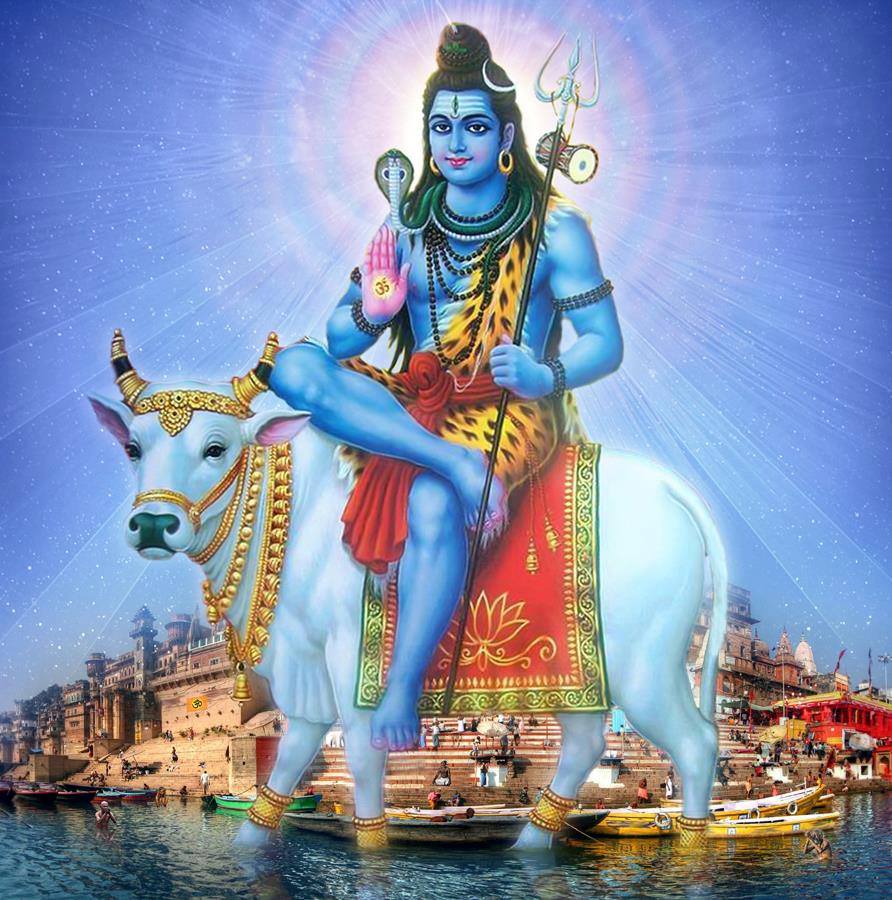
I do not believe that I'm senile.
My mind is as clear as it ever was, my reasoning unimpaired.
I express emotions more freely now than I did as a young man,
No longer fearing anyone's ridicule.
Life has knocked most of the false pride out of me
But in any quarter of the wind
I know a hawk from a handsaw.
I no longer care to claim the pretext of religion.
Christianity cares not a rap for the soul of a dog,
Has no plan of Redemption for animals.
Anyway, each time I try it, it all falls apart on me.
I live in a permanent dark night of the soul.
Hinduism is the only belief that I've found
That can't fall apart, doesn't seem to self-destruct under pressure,
Perhaps because it's so relentlessly fatalistic —
Shiva dances, worlds die;
Kali wears a necklace of skulls, drinks blood,
And stands triumphant on the corpse of Shiva.
Om namah Shivaya. Jai Kali maa.
I have been reading Wallace Stevens' poems
In search of solace. My mind, as always, reels
With unassimilated thoughts and images.
What do the dead know, if anything?
What do we know of death and of the dead?
What is death, does it even have a being,
An essence, or is it naught, stark obliteration?
And what are we, we sentient living beings,
Humans and animals — are we souls?
What is a soul, and can it be destroyed,
Is it destroyed by death? We need to know.
The question hangs forever in our ether,
Perturbs our thought, muddles our sleep.
He says that two forms move among the dead,
High sleep, high peace, two brothers, plus a third,
Our earthly mother, mother of the dead,
Who says goodbye to those who cannot answer.
Do the dead sleep, does Tonya sleep?
Is death truly high peace?
Or is it liberation, or ceaseless exploration,
Or restless questing after yet more experience?
Does Tonya, freed from her body, roam endlessly
Through field and forest, running, hunting, seeking?
Or does she sleep now, dreaming she does these things?
My own soul cries out vainly for some answer.
—oOo—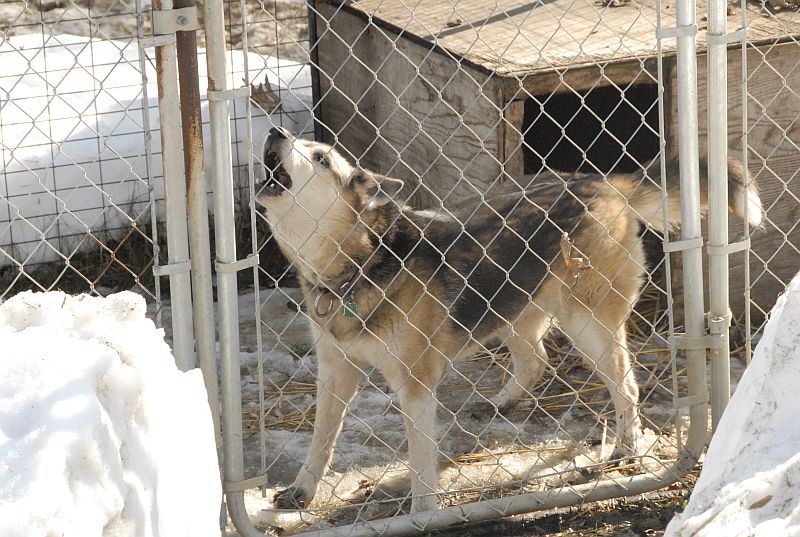
Tonya had a song that I sang to her quite often
To the tune of "Guantanamera" more or less:
"Ton-ton-amera,She would inevitably yawn with embarrassment
My leader's Ton-ton-amera,
Ooo she's so beautiful
And she's my Ton-amera
And she's so sincera
Sweet Ton-amera
Hey Gorgeosa"
Whenever I sang her song to her.
Likewise she had several nicknames,
Derived from her song or otherwise:
Ton-Ton, Tonner, Tonamera, Sinceramera,
Tonamera-Mine-Devine, Noble Lady,
Tonner-Ma-Ronner, Tonamera Sincera.
I used to talk to Tonya quite a lot.
If I looked her dead in the eye and raised my voice
She would answer back. We would hold long conversations,
I in human speech, her answers in roodleing dog-talk.
She always insisted on having the last word.
High sleep, high peace — I don't know if I quite believe that.
Obliteration, nothingness — perhaps.
That is ugly enough to be believed.
Yet sometimes I suspect that Tonya wanders,
Ethereal, mostly invisible,
At times glimpsed from the corner of an eye,
Running and hunting, graceful and fleet of foot,
Ceaselessly, over these hills, behind the sloughs,
Down the grid roads running tirelessly,
Or into the national forest park nearby.
Surely she wouldn't miss that opportunity —
Tonya fancied herself the Mighty Huntress,
Would seize any chance to run off for a hunt.
I never was able to trust her off the leash —
She would slip through an open gate and disappear,
Gone for hours or days on her own private business.
Gone is gone. Dead or run off — what's the difference?
Well, dead, she won't be found, will never return
(Unless we meet beside that "Rainbow Bridge"
That seems to have become such a popular myth).
But not to know — that's what's killing me.
Obliteration, sleep, peace, wandering
Or reincarnation: back into life again,
But changed past recognition. Again a dog?
Or a human person next, or maybe a horse!
And will I know, when I meet Tonya again
In some new guise, in another future life,
Will I know that's her, will she recognise her old Boss?
Perhaps I'll be the dog next time and she will be human.
Not to know. Not to know. That's what hurts.
—oOo—Hey, hey, Noble La'y!
Tonya, if you're there at all,
Stay near me now, don't fade away
Hear your old Bossie when I call.
I miss you, Tonya, night and day.
Without you I falter and I fall.
As Ezra Pound once wrote, "The case presents
No adjunct to the Muses' diadem."
No threat am I to Tennyson and Milton,
In these postmodern times "They sleep, the Nine."
No matter. I must do this anyway.
It may not be pretty but it's necessary —
Like a gall bladder operation.
I had one, yes, five years ago,
Although the doctors didn't quite say so
I think that I came rather close to death —
The organ was gangrenous. I can still recall
When I awoke after the surgery
I felt a profound, a total loss of affect.
I did not care whether I lived or died.
As it happens, I lived; my dogs, perhaps,
Had something to do with that. I was visited
In hospital by Tonya's understudy
Lizzy, her niece, six years her junior.
Lizzy crawled into my bed and begged me to live.
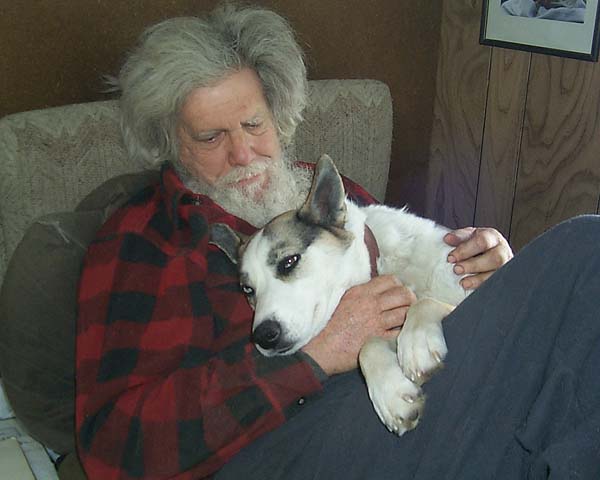
Lizzy — sired by my best male leader Lloppie
Out of Tonya's younger sister Kolyma.
Properly Lizaveta of Seppala, nicknamed
Liz, Lizzawort, Lizard, Wort-The-Skort,
Wizard, Wizzer, always and ever Lizzy.
Another natural leader, much as Tonya was,
Liz ran with Tonya in her latter years
And soon became Boss's number two sidekick.
Liz inherited her daddy's swooning love —
At any opportunity she drapes herself
Across my chest and quietly blisses out.
With Tonner gone I'm utterly dependent
On Lizzy and her quiet confiding love.
If we are to speak of consolation
Lizzy is it.
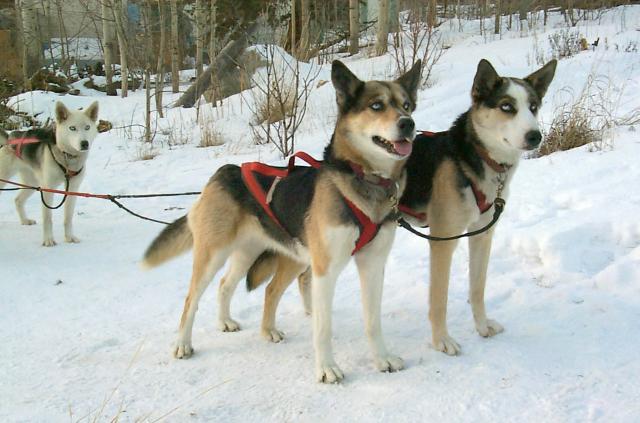
Tonya is dead.
I watched her die.
I dug her grave
And laid her body in the damp earth.
I remember these things
As I also remember many other facts and events of her life
But memory is a liar and a cheat.
It asserts but is unable to prove.
It colours, shades, polishes, omits, adds and rearranges.
What I carry around in my memory
Is not the Life of Tonya but the Myth of Tonya.
The Myth of Dog
Is a trivial rearrangement of the Myth of God.
I knew Tonya much better than I ever knew God.
Tonya gave me more satisfaction than God ever did.
It worries me that I can so easily mention both in the same breath.
I am not much more sure now of Tonya than I am of God.
Some memories of her are vivid and quite beyond doubt,
But only six months after her departure
Certain details are slipping, sliding away, fading,
Undergoing the inevitable transmutation into myth,
And that is only the past. What then of the present, the future?
I do not know where Tonya is, beyond the fact
That the decaying and frozen remains of her physical being
Lie just across the farm lane beneath an oval of stones.
Shall I ever see or encounter Tonya again
In any way, shape or form, however partial, however changed?
I may just as well ask if ever I shall see God.
I cannot emphasise too greatly the agony of that unknowing.
—oOo—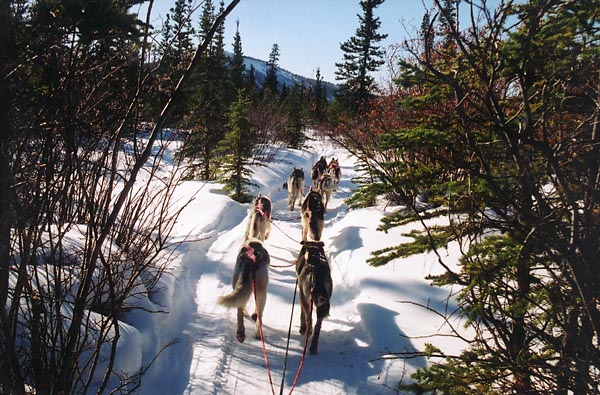
When Tonya was alive
I knew trust
I knew companionship
I knew love
Each of these perfectly illustrated,
Demonstrated in everyday reality
Each including clearly defined limitations.
I could trust Tonya
To lead my dog teams
To follow the trails and make the necessary turns
To provide focus and impetus for the entire team
To get us, dogs and driver, out to a turnaround point
Fifteen miles or so into lonely Yukon hinterland
Beyond the roads
In subzero winter conditions
Far from any hope of assistance or rescue
And to bring us safely back home.
I trusted her with my life.
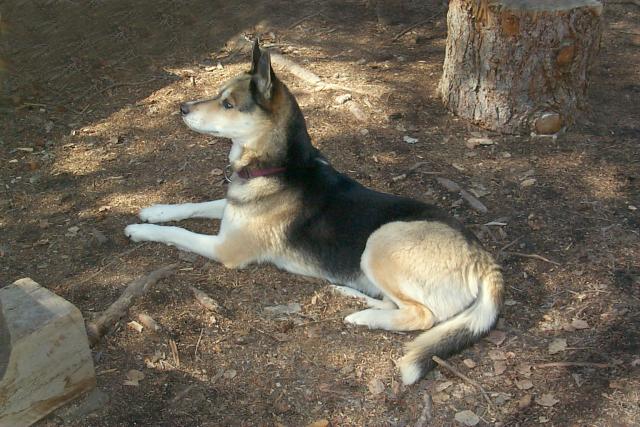
Where to go, which turns to take and what pace to adopt,
To pedal on heavy trails, to use the brake when needed,
To help her keep things tight and orderly
And to keep control of the sled.
(If I lost control of the sled that was my hard luck
And I could do the march of shame, going home on foot.
I could not expect her to remain at my side off leash,
Or to stop a runaway team —
Such were the limits of trust.)
Tonya would be my faithful companion
Going with me almost anywhere I cared to take her.
She would sleep on my bed,
Wait calmly in the truck cab,
Or undergo hours or days of long distance truck travel
Curled up on the passenger seat of the Dodge.
I was expected never to leave her behind
And to offer special extras — ice cream cones, leash walks.
(I once left her behind on a long-distance trip
Thinking to spare her a long and tiresome journey;
Things were never quite the same thereafter —
I became undependable in her eyes.)
Tonya loved me sincerely, as I loved her;
She happily shared my life and gave all her affection.
(But, as I have said, her love was proud and demanding.
Tonner was always spirited, always pushed back
And always was somewhat embarrassed by what we called "smooshering" —
I think my love was a little too mushy for Tonya.)
Now I own only memories of trust, memories of Tonya's love and companionship,
All of them changing, fading, slip-sliding away.
These things once so bright and so real —
Where have they gone? How can such realities,
So brilliantly immanent, present, demonstrable,
Metamorphose into grey mist of fast-fading memory?
Where does reality go when it passes and vanishes?
How can anything be real and not be eternal?
Where must I look to recover the love that was Tonya's?
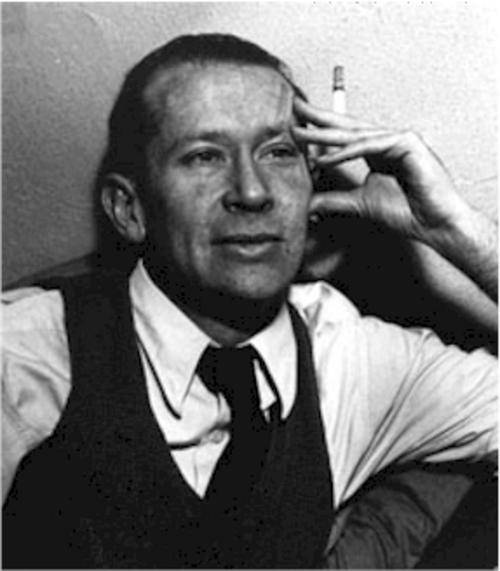
my tonya loped through snows of dream — tribute to e. e. cummings
my tonya loped through snows of dream
through drifts of love, through suns of seem
pulling each winter through each spring
my tonya loped through months of sing
laughing each day from buried night
my tonya loped through blues of white
in dusty summer's truck she'd ride
down ice cream streets in highway pride
fun was her fame and fame her fun
through yukon wilderness she'd run
leading her teams of pull and push
she loped her life through years of bush
scorning the hype of quest and 'rod
she howled down trails of lonely god
her feet were feet, her fur was fur
my tonya loped through lakes of sure
she haw'd her haws and gee'd her gees
over high berms of whoa and please
her swift was light, her light was swift
through blizzard, powder snow and drift
her blackred gangline tight with yes
her harness padded with rejoice
because my tonya lived her trail
love is the course that will not fail
Tonya is dead.
I watched her die.
I dug her grave
And laid her body in the damp earth.
It is time to speak of the manner of her going.
Few elegies even mention the cause of death.
Perhaps the Reaper's tools are thought to be bathetic;
I am wary and respectful of bathos but unafraid of it.
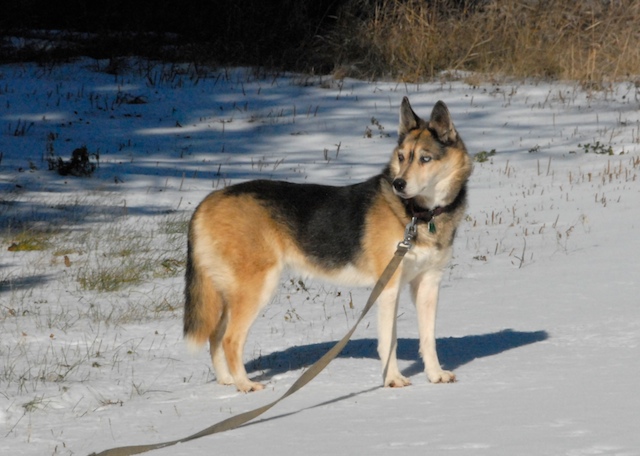
Tonya died of metastatic cancer.
In her old age she developed a mammary tumour
Which slowly grew and dribbled blood and serum.
Eventually the cancer metastasised;
Finally (I think) she died of organ failure.
Her right eye, always weak, plagued with conjunctivitis,
In her old age finally developed glaucoma.
This was treated but it left her partially blind.
Between the eye and the tumour she was often crabby.
Undoubtedly Tonya saw her share of suffering,
But on her fifteenth birthday she was still Gorgeosa,
Strikingly beautiful and still quite ready
For a long, strenuous walk on a thirty-foot line.
I often thought
That as an old dog, had I dared to put her in harness
Tonya would have died happily leading a dog team.
Of course, knowing that, I would never have risked it.
Death waits for me as it waited for Tonya.
My father died aged forty-nine of a cerebral haemorrhage,
My mother at seventy-nine of lung cancer.
Taken together, their average longevity was sixty-four —
I'm sixty-six now, living on borrowed time.
What Tonya knew, I shall soon know: suffering and death.
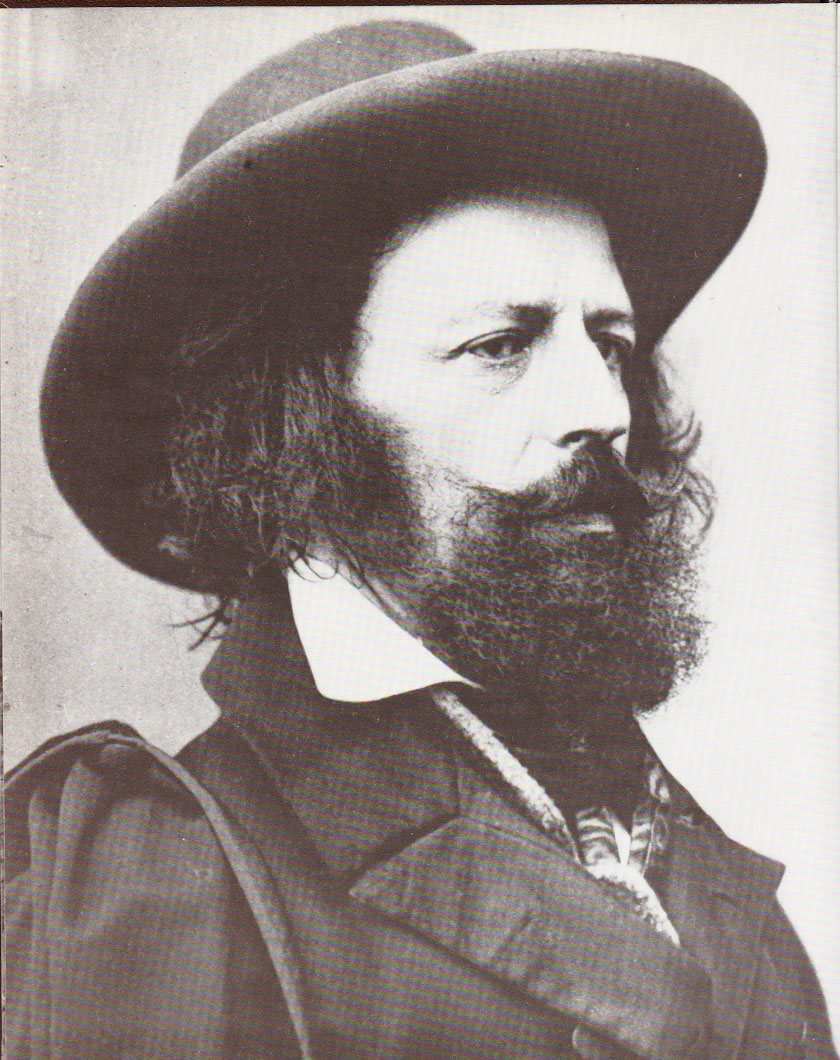
APOSTROPHE TO SORROW — HOMAGE TO TENNYSON
O Sorrow! Since you will not leave
My soul in peace, whole and alone,
But rack my heart with thoughts of one
Lost past my power to retrieve
Whose form beneath this pasture stone
Lives in my memory and love,
Though eye and ear no longer prove
Her presence here in flesh and bone,
My sad sincerity approve,
Your hand in sympathy extend,
Your solemn consolation lend,
My empty heart's despair to soothe,
And be to me a constant friend.
No more vain hope let me believe,
That single-hearted I may grieve
Steadfast and faithful to the end.
Tonya descended from a long and distinguished sleddog lineage, the Seppalas. Her ancestors of a century ago all came from eastern Siberia, where the remains of domesticated dogs were recently discovered that have been carbon dated to thirty thousand years before the present. For nomadic tribes of Chukchi, Yakuts and Kamchadal, dogs were an essential part of life, needed for hunting and transport. Brought to Alaska early in the twentieth century, they served the transport needs of the Nome Gold Rush. One of the most renowned dog drivers of that era, Leonhard Seppala, made the Siberian dog his own. Tonya's ancestors all were Seppala's dogs. Now, fifteen or twenty generations down the line, the need is gone. The Seppala dogs remain, yet they fit no purpose in the way that once they did. The sole secure remaining purpose for sleddogs today is racing, and racing has moved on to faster, more specialised dogs. Seppalas remain as quintessential emblem of the Myth of Dog, but as far as purpose goes they are mostly recreational. Retired, redundant, out of work, unemployed. Tonya was the end of their story, more or less. A few young dogs of the pure strain remain — Lizzy, for one — but Tonya was the last really noteworthy Seppala leader. I found the Seppalas on the brink of extinction in 1970 and managed to buy them another forty years' existence, with the help of others. The bloodline may yet carry on in a small way for another quarter century, with luck, but in the end their fate is clearly extinction.
—oOo—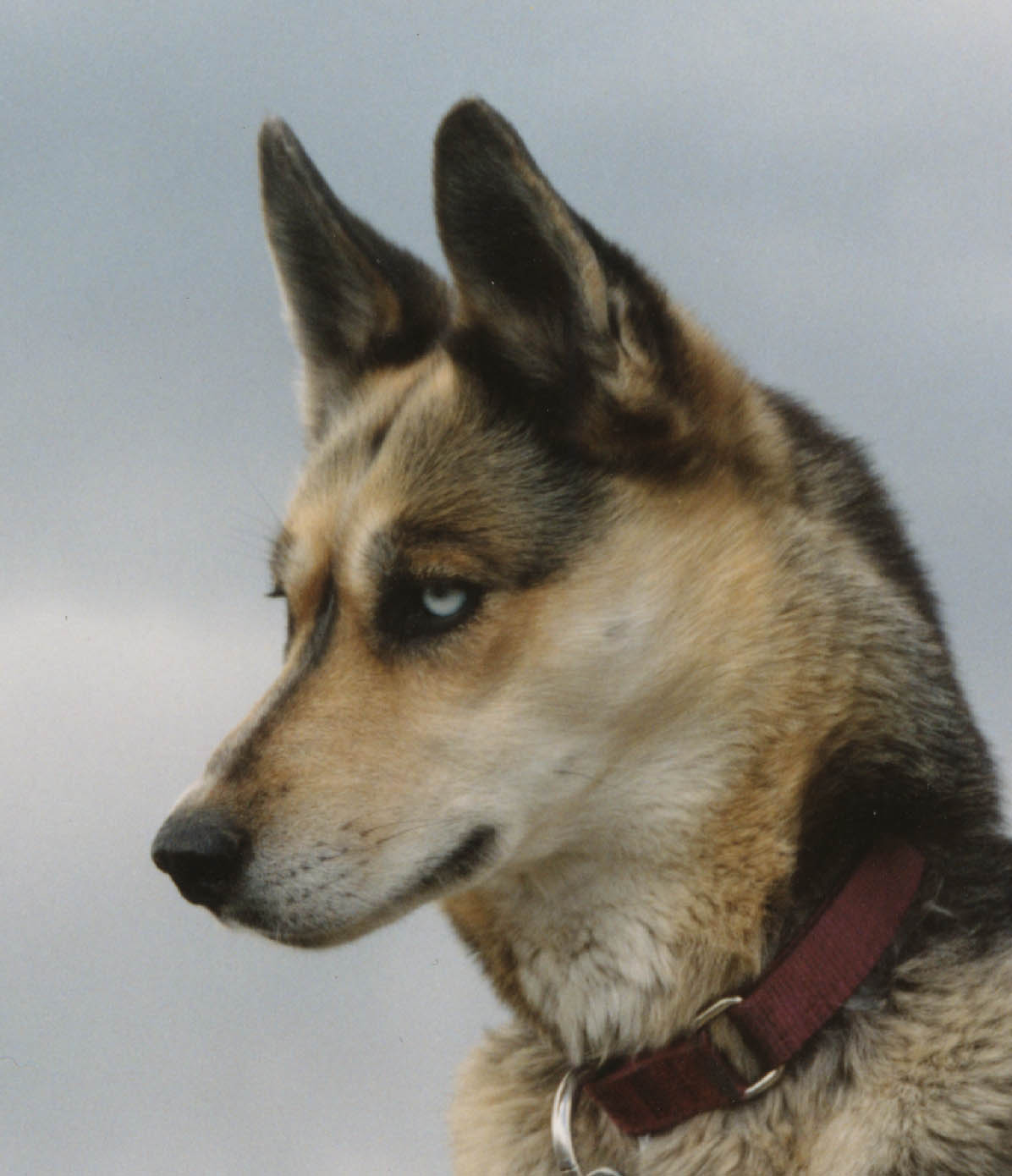
Tonya's ancestral lines are known to me In full, back at least to the 1930s And largely back to the 1910s and '20s. Here is her descent in the tail-female line Beginning with her dam:
- River View's Sprite, the daughter of
- Powder of Markovo, the daughter of
- S-A Athena of Markovo, the daughter of
- Mokka of Markovo, the daughter of
- Frostfire Anisette, the daughter of
- Malamak's Jaunty, the daughter of
- Vixen of Seppala 4th, the daughter of
- Zaza of Seppala, the daughter of
- Mitzie of Seppala, the daughter of
- Zarina of Seppala 3rd, the daughter of
- Polly of Seppala, the daughter of
- Ilona of Seppala, the daughter of
- Pearl of Seppala 2nd, the daughter of
- Nanna, the daughter of
- Mona, the daughter of
- Dushka, the daughter of
- Nanuk.
- Xpace of Seppalta, the son of
- Uelen's Ebony of Sepp-Alta, the son of
- Uelen's Baron of Sepp-Alta, the son of
- Surgut of Markovo, the son of
- Shango of Seppala, the son of
- Ruffo of Seppala, the son of
- Foxstand's Sunday, the son of
- Polaris of Sapawe, the son of
- Charney of Seppala, the son of
- Bonanza of Seppala, the son of
- Smokey of Seppala, the son of
- Kingeak, the son of
- Togo, the son of
- Suggen, the son of
- Ugruk.
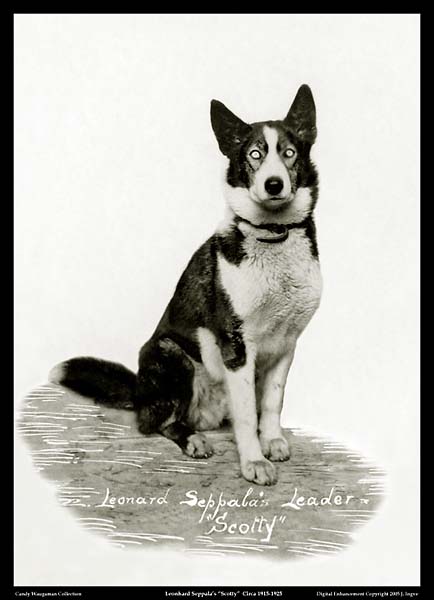
In the sire-line of her pedigree.
Perhaps most significant of all to me
Is the fact that elsewhere in Tonya's pedigree
The name of Leonhard Seppala's 1915 leader Scotty
Occurs some thirty-two times.
Hers was an heritage in which I took great pride. —oOo—
Six weary months have passed now
Since Tonya died and left me in Manitoba.
Where is she now, I wonder? What is she doing?
Somehow I no longer feel her demanding presence;
This may be entirely my own fault.
Sometimes now I forget, I get in the big green Dodge
And go some place with Lizzy without first
Going to Tonya's graveside, asking her permission,
And requesting her to accompany us.
Tonya was right. I am undependable.
But still I go to her graveside every day.
I still wear her collar.
It is February now. The days slowly grow longer.
A week ago my wife and I decided
It really was time for us to make an effort
To get back to driving dog teams.
I hadn't driven a team since 2007,
My last year in the Yukon.
We snowshoed out a short trail on our home acreage.
The snow was deep in places.
The trail had little bottom —
Two dogs couldn't haul me around it.
Next day we hooked a four-dog team:
Lizzy and her sister Lara at double lead,
Their brothers Lev and Lenny at wheel.
It didn't go well.
Just as I slipped the snub rope to start the run,
The team hit the lines hard and the driving bow
Broke off in my hand, leaving me standing there
As my team and sled went barreling off down the trail.
For over an hour we struggled to recover the team,
Floundering on foot through the deep snow.
I saw them twice, two or three hundred yards distant.
They made it through two-thirds of the trail
In perfect order, the sled upright, no tangles,
Then they missed a sharp right turn, went into deep trackless snow.
Tired, Lenny went down and was dragged by the others —
He almost strangled. Susan found the team
And managed to hold them until I could get there.
She walked Lenny home slowly once he'd recovered,
While I drove the team down the rest of the trail to home.
No permanent harm was done, but we were all shaken.
Our sledding gear is old and worn;
So am I.
Yesterday I bought a twenty-year-old snowmobile,
Something to be used to set a decent trail.
Here where prairie winds blow, a trail disappears overnight.
I am too old to keep trails open on snowshoes.
Am I crazy to try to drive sleddogs now, without Tonya?
Yet Lizzy and Lara themselves are fine leaders — they learned from Tonya.
Tonya's son Ivan is ready to learn it from Lizzy —
The young ones deserve their chance.
A pity I'm no longer young.
Tonya, were you ahead of that loose four-dog team?
Did you lead them through that faintly-marked trail?
Or were you just standing by, shaking your head,
Thinking, "Bossie, you'm still undependable,
You lost control of the sled again."
Sometimes it feels as though Tonya were lost,
As if she had escaped again to go on a hunt.
Absent is the anxiety — she can come to no harm —
Yet the same feeling of hopeless searching is there,
The same involuntary restless movement of eyes
Scanning the brush, the hillsides, the fence-rows and sloughs
For a dog who will not be found.
I seem to search for Tonner everywhere
In spite of knowing that I shall not find her.
This searching is beyond volition, it happens
Whether I wish it or no, rather as if
I had lost some vital part of myself, my soul,
My love perhaps, and were now
Condemned to seek it always, everywhere,
Forever after, questing fruitlessly.
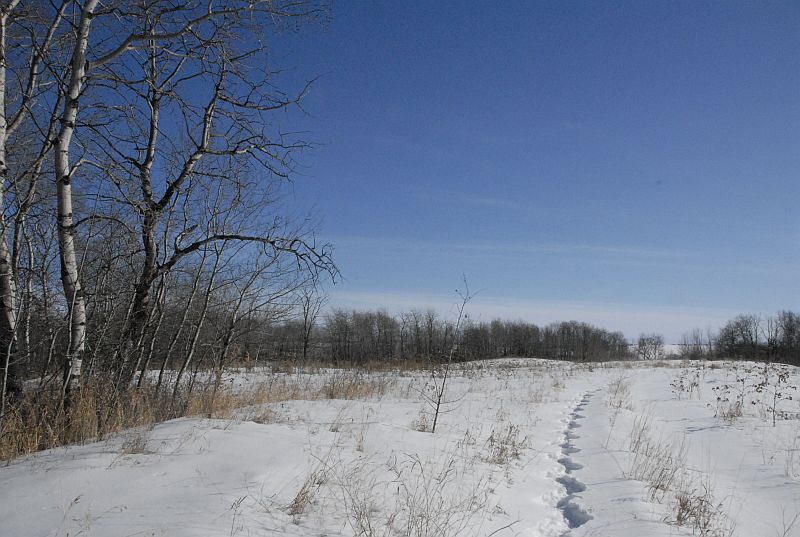
The swift returning February sun
Scalds the snow-covered fields of Manitoba.
Still hovering low, tethered to the horizon,
It batters the eyes, making them squint and water.
The snow and ice still rule, but here and there
The black earth breaks through.
Crows already are returning.
This is the rear end of the long prairie winter.
Restless, I decide to go for a walk.
I put on snow boots, coat, a woolen tuque
And walk toward the pasture. Passing Tonner's grave,
I ask her to come along — if she is there.
Somehow I don't quite feel she is.
Overhead a soaring raven croaks and gurgles.
The snow is a foot deep — six to eighteen inches,
As the will of the prairie wind has carried it.
Tracks of fox and coyote are everywhere.
Nearby a magpie yatters and yanks; in the distance
An early tractor growls. Underbrush and forest
Seem drawn on the canvas snow in strokes of charcoal,
Relieved only by accents of tan and umber,
Infinitely detailed by some fanatic artist.
I call out Tonya's name again and again —
No answer. My calling dies without an echo
From the stripped trees or the snow-padded hillsides.
This part of the pasture belongs to Cocù and Wawa;
Both of them were buried on this hillside
To roam forever with the coyotes and foxes.
I call their names, asking if Tonya's with them.
Then as I stand silent on the snowy path
Marked by a coyote's purposeful tracks, I reflect,
Thinking of other Seppalas buried on this farm
In the past five years — too many. We arrived
With a lot of old dogs, and death claimed several youngsters.
If I called them all, a dozen dogs would surround me:
Chenuk, Chena, Markov, Anastasia,
Yolanda, Ranulf, Happy, Hippy and Queequeg.
As well as Wawa, Cocù and Queen Tonya.
Suddenly I feel myself at the centre of an unseen circle
Of furry ghosts.
What's wrong with me? Why can't I fix my attention
On the living, deserving sleddogs kenneled at home?
Why this sudden obsession with the dead?
As I walk about the kennel, feeding the living,
I think, "In only a couple of years, or five years,
"In too short a time, you will be ghost dogs, too."
That ill-fated training run the other day
Nearly made a ghost-dog out of Lenny —
Let's have no more broken dogsleds!
I leave my reverie and scan the landscape.
The snow-light through the leafless trees and bushes
Gives a more commanding view of these environs
Than at any other season. But let's face it:
If Tonya was out there, only by sheer blind luck
Would my eyes detect her form in all those bushes —
Black, charcoal, white and tan are her colours, after all.
With a sigh, turning, I begin to retrace my back trail.
When I leave the deep snow and reach the ploughed loop of the grid road
Almost home, there is a sudden feeling
Of Tonya's presence. I glance downward and say,
"Well, there you are! Where were you all that time?"
There is, of course, no answer. I walk back home
And leave her — I think — at the spirit house by her graveside.
I wonder if this was just a fantasy.
I could be losing my mind.
Trying to Explain Things to Myself
"It had been real. It was not now."— Wallace Stevens, "Repetitions of a Young Captain"
Look at it this way:
what was real
one year ago
is unreal now.
Change is constant,
relentless,
breathtaking
and unremitting.
The universe, they say,
was once a monobloc,
which exploded
in a big bang.
Now it is an infinitude
of planetary worlds,
stars, nebulae, galaxies,
still expanding.
They argue about
whether it will expand forever
or reverse the process
and implode back to a monobloc.
Change, at least,
is certain:
worlds were created,
worlds will be destroyed.
If your world
happens to undergo destruction
you must endure this
with polite helplessness.
On a smaller scale,
one year ago
Tonya existed —
she was your dog and friend.
Today there is no Tonya,
she died and is gone.
This, too, you must endure
with polite helplessness.
— I have a question:
if what was real then
is unreal now,
what is real now?
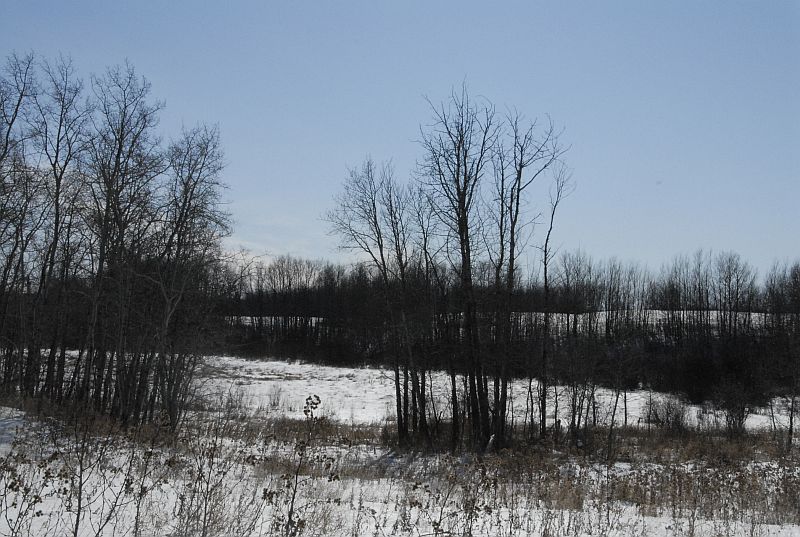
Of sunlight, snow, bare trees and underbrush
A lost dog might be hiding, but is not."
The intense, blistering sunlight
Reflected from snowpack covering these fields
Conceals an abyss of loss:
Anywhere in this chaotic jumble
Of sunlight, snow, bare trees and underbrush
A lost dog might be hiding, but is not.
Never was light so treacherous and false.
Has Tonya vanished into light or into darkness?
Is the world of death a world of light
Or is it a world of impenetrable blackness?
Is there, indeed, a world of death at all,
Or do the dead just cease to exist, snuffed out
Like so many weak, flickering candles? Obliterated
By the breath of the Reaper.
If Tonya now exists only in my memory
Then in her fate inevitably I see my own
And when in turn I go, again she is lost.
Thereafter, Tonya would exist
As minor memories in the minds of a handful of people,
Some photographs, here and there a few written words,
Some pedigree records. Is this possible?
Is it reasonable to think
That anything so brilliantly conceived as she,
So vivid and unique in her existence,
Could flicker out and simply fade away?
The thought appalls me.
No, but at least her physical remains
Beneath the pasture stones could still be found.
Once again I return to her graveside.
Though only a couple of the stones protrude
From underneath the snow, I know she's there.
It's something to hold on to.
Although her body must of course decay,
Returning to the soil, still her constituent atoms
Remain. Matter can't just be destroyed.
No, but those very atoms were never hers —
She borrowed them and has to give them back.
Those atoms are not, were not ever, Tonya.
Then neither are my memories, the photographs,
The words, the records, any such manifestations.
Who, then, can say what Tonya really was?
An energy, complex, force, a field, a feeling —
Call it a soul, fall back upon the time-hallowed word
Which explains nothing, is but a statement of ignorance.
How can I know where Tonya is
When I never even knew what Tonya was?
While yet she lived, experience shouted, "This!
"Right here! This dog, this proud insouciant quadruped!"
Incontestable experience proclaimed Tonya's existence,
Yet I never knew what that experience was.
This, this is the abyss concealed by sunlight.
—oOo—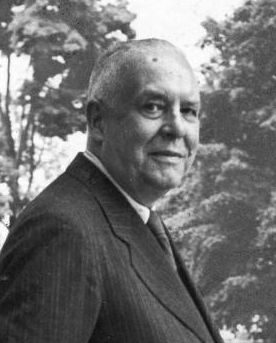
Raven Over Snowfield — My Deeply Respectful Tribute to Wallace Stevens
Discard the mauve chagrin, the faded emotions,
Dismiss the tooting hierophants of death.
What is left is our sense of the most necessitous,
The indispensable, essential image,
Solace and sustenance, stout fund of feeling,
That thing without which everything is junk:
The image of Tonya, say, in a blue snow-light,
Imagined by the greenest imagination;
But not the brown enigma of the soul.
Croak as you fly westward, soaring raven,
The sun reflects from shards of ice and snow
And casts blue shadows of frozen leafless trees;
This is her heartland, not the dark shores of Hades.
Exile hallucinations of the dead.
Proclaim her homecoming to Manitoba.
The imagined reality must be enough:
Tonya made permanent in fields of snow-light,
Running her trail. It must be this or nothing.
That was weird; I didn't really think I could do that.
I sat with blank paper before me, thinking "How
Can I possibly do Stevens?", not an idea in my head,
Began to jot down words and phrases. Then all of a sudden
It was almost as though the man reached out his hand,
Saying, "All right. I'll help you." I know it sounds crazy.
Otherwise — somehow some knowledge just assembled itself.
In any case, now I am stuck with a Stevensian synthesis.
One might do worse; I confess I had none of my own.
But the grieving heart still cries out, "Is that all there is?"
Is that all that's left of Tonya — an imaginative image?
I suppose it's possible that it may be so;
My head aches with the pain of what I don't know.
Each day I wait for time to work its weal
Hoping somehow my heart may heal its wound.
It still is February, yet the sun,
Strengthening each day, prods on the advancing year
Towards equinox and onward to the solstice.
Each day I think of Tonya, visit her grave.
A dozen times or more each day I push
Her collar up my arm, back to my bicep.
Though days may lengthen, seasons advance, not I.
Fixed in grief and denial, set like stone
My stubborn soul will not let Tonya go,
Not yet, at least, will not just let her fade
Gracefully away into a pleasant memory.
Why should I? Fading is false. Two possibilities
Jostle within my brain: Tonya is gone,
Snuffed out, or else she exists on another plane —
I know not which is true, nor how to choose.
Here are no asters, crocuses or violets.
It is early March. The fields are choked with snow.
Dry tufts of dead brome grass break through, sun-scalded.
The same anonymous raven soaring westward
Through the deep air without a single cloud
Gurgles and croaks. The lakes and sloughs lie frozen.
It is still too early for returning geese.
There is nothing to look forward to today.
My eyes search the fence rows, looking for a figure,
Black, tan and white, curved tail, dark ears, white feet:
The dog that isn't there, the wraith of Tonya,
Her absence in reality. Now an obsession,
This constant search occurs without volition;
Seeking, scanning, knowing I shall not find
The object of my bootless incessant search —
Too long, like winter, with no end in sight.
Lead Dog
Here beneath
these pasture stones
I have buried
what was left
of fifteen years
and nine months
of trust, love
and companionship —
almost one-quarter
of my own life.
Her life's trajectory —
from wild puppy
to ambitious
yearling sleddog,
to first-string lead dog,
constant sidekick,
brood bitch,
to kennel queen,
emblem of her breed,
senior leader,
to stubborn old dog,
to gallant aged wreck,
to forty-pound
furry corpse —
was like a meteor
across my sky.
Gone now
her pride,
her brilliance,
her speed,
her determination,
her spirited performance,
her demanding ways,
her amiable
condescending friendliness,
her striking beauty,
her singularity,
all gone.
Still, as ever
she leads the way,
because I remain here
beside this grave,
bewildered,
mourning her,
asking each day,
asking, "Where did Tonya go,
so far beyond me now,
and how could
all that she was
be reduced
to what lies
here beneath
these pasture stones?"
Easter Sunday 2012
Good morning, Tonya. Every day
Takes me one small step nearer thee
Death is the certain path I see
Perhaps there is no other way.
The days drag by, the way is long,
Labour is hard, fatigue is sore;
I hunger for some nearer door,
Some ending to this endless song
Of suffering and hopeless grief.
Meanwhile I do but what I must;
I hope not to betray my trust.
The present day brings no relief.
Each day these sleddogs must be fed,
Their need for love must be supplied;
Their pleadings cannot be denied
Though idle stands the broken sled.
Though empty harness gathers dust,
Though vacant stands the puppy pen,
The contract between dogs and men
Unbroken must remain — it must.
As they stand tethered by their chains,
Those selfsame chains have fettered me.
Tonya, though thou hast broken free
The longer consequence remains.
Where thou hast gone, I cannot go —
Not yet — until the last dog dies.
I look into their eager eyes
And realise my path is slow,
Circuitous and conscience-bound,
So each day takes me towards a death
Deferred with every in-drawn breath,
Though Tonya lies beneath the ground.
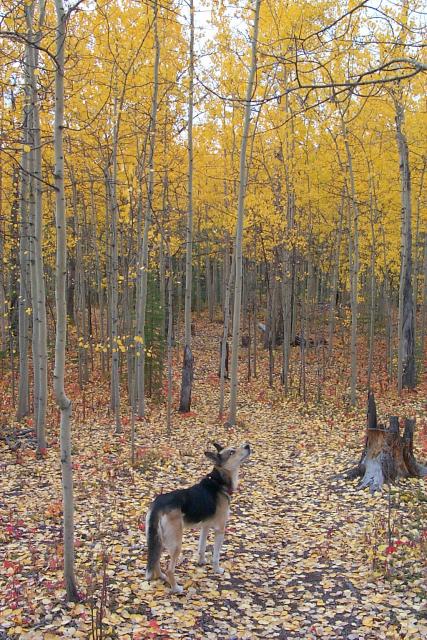
Nothing endures but change, said Herakleitos.
Everything changes, nothing is exempt,
Yet somehow also everything remains —
Existence, as such, is perhaps eternal,
Though ever-changing, never ever static,
Endlessly coruscating, mutable.
Tiny stars twinkle and flicker, as we see them
With earthbound eyes, yet in reality,
Nuclear furnaces, vast, distant, huge and hot
Surpassing the limits of our imagination.
So poor are the perceptions of our senses.
Blake wrote, "How do you know but every bird
That cuts the airy way is an immense world
Of delight, closed to your senses five?"
I knew Tonya as a dog through my perceptions,
Strained through the constructs of my human mind,
Filled with my own preconceptions of dogs.
What did I ever really know of Tonya?
Of Lizzy, who nightly sleeps beside my pillow?
Their love, their joys, their fears, their pain, their sorrow?
What do they know, what must they think, of me?
Most of the things I do must make no sense to my dogs
And I must sorely fail to comprehend
And grievously underestimate them, too.
Twinkling stars as they seem to my purblind vision,
Who knows what nuclear furnaces of feeling and affect
Lurk beneath their modest furry hides?
Tonya coruscated through my life,
More meteor than distant, twinkling star,
Leaving me dazzled, blinded, stupefied.
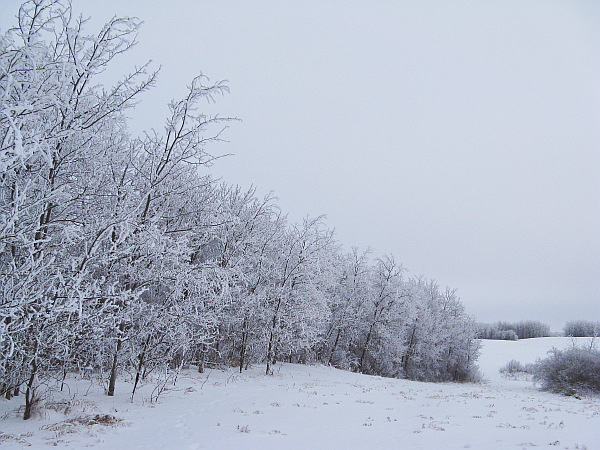
As I turn and walk from her graveside, I pause to reflect:
Tonya is gone, yet somehow Tonya's love
Lingers, endures, as if an aroma of myrrh
Hung subtly around her memory, her graveside,
Her truck, her pen, my bed, this very farm.
Perhaps because Tonya's love, my love for Tonya,
Were never really hers or mine, peculiar
To Tonner or to me as individuals.
Love is just Love, it transcends the particular.
The selfsame love I knew — and know — through Tonya
I know again through Lizzy. Love is love,
Undifferentiated; if any value
Or feeling is eternal, it is this.
And still past fragile apple-greens of springtime,
Through the heavy, somnolent dark green of highest summer,
In the golden nostalgia of falling poplar leaves
And the bitter ascetic white of frostbitten winter,
Evanescent, ever glimpsed from the corner of an eye
My heart catches traces of Tonya's passage,
Ethereal, ectoplasmic, transient,
Restlessly questing over pasture, through woodland,
Behind the sloughs, through fields, over hills, on the skyline,
Hunting, loping, fleet of foot and rhythmic,
Down forgotten paths, by shores of ponds and lakes,
Tireless, free, unfettered,
Joyously flushing grouse and cackling ducks,
Following the raven's airy track to the west,
Rejoicing in freedom forever,
Forever creating her trail as a running sleddog.
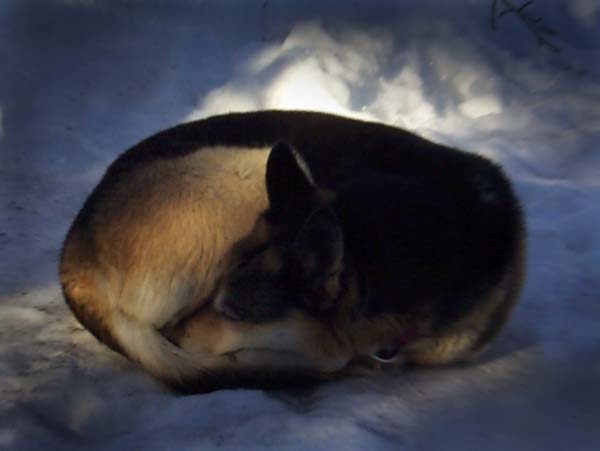
And when the gold-vermilion prairie sun
Sinks sullen, slow, beneath the western horizon—
She sleeps. She sleeps. My Noble Lady sleeps.
And now, if you will, please read Out of the Romantic Heart (Coda), a final retrospective poem in homage to Walt Whitman (whom from the beginning I wanted to honour as one of the poetic sidemen in Tonya's Elegy).

